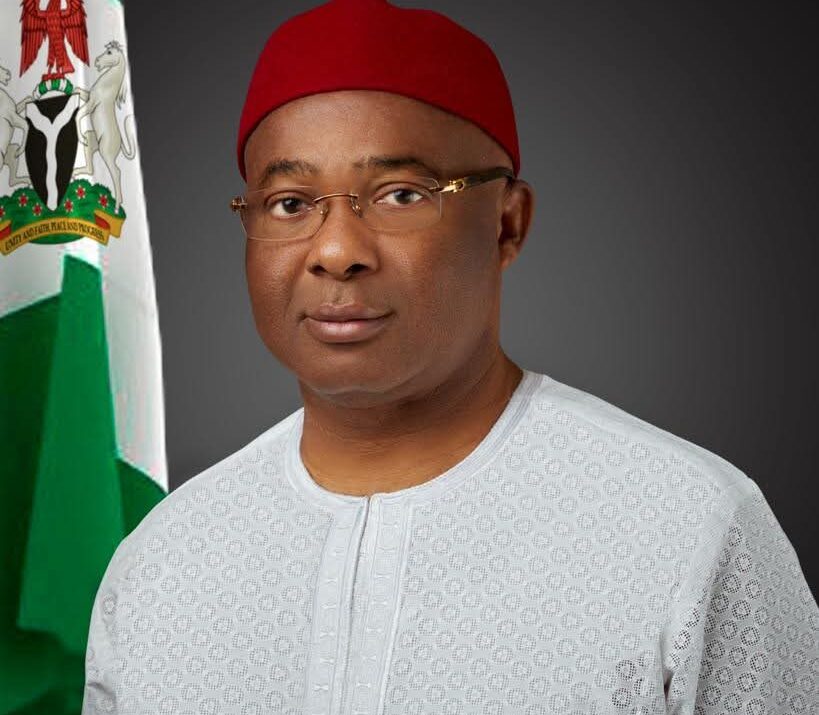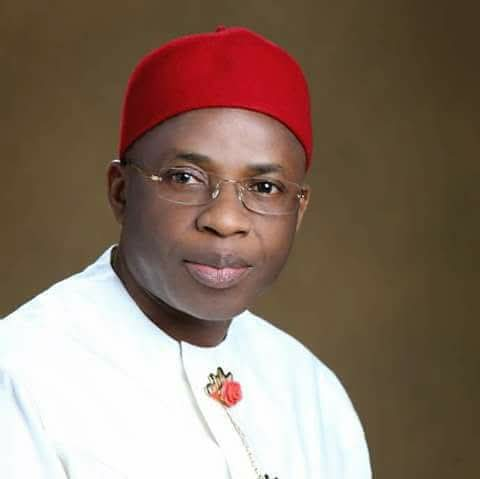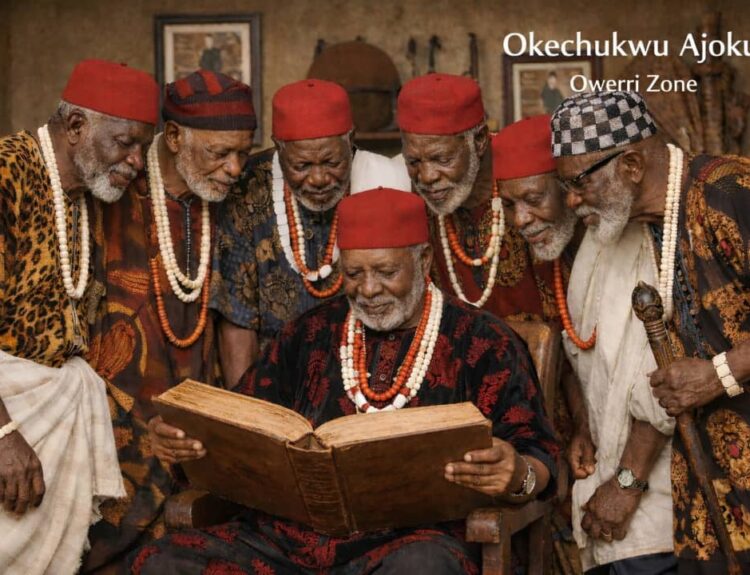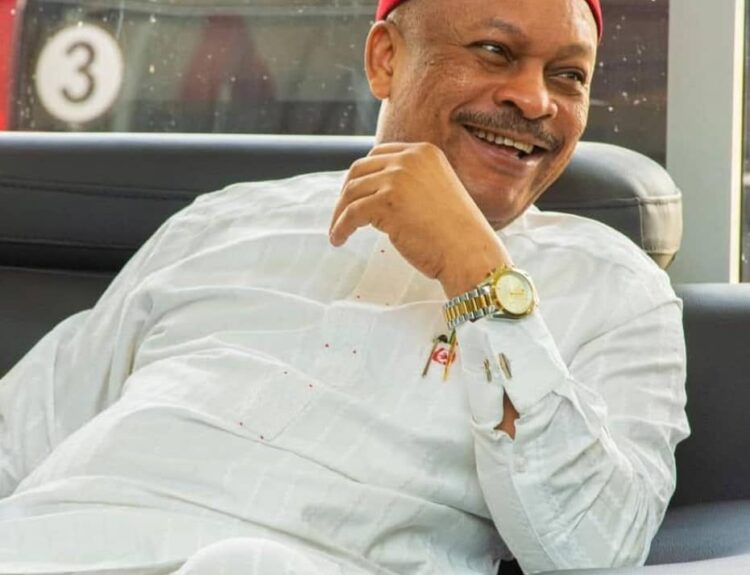BY ETHELBERT OKERE
The main argument of critics of the current two-term (of four-year each) tenure structure is that it potentially leads to complacency; in the sense that a president or governor in his second term, now conscious of the fact that he has no other election huddles to cross, may throw good governance over board and do whatever he likes. This argument is not entirely unfounded but there are instances where governors in their second term have performed with even a larger enthusiasm than in their first term. Imo state, currently under the watch of Governor Hope Uzodimma, is one of such instances.
The first pointer is that Governor Uzodimma still holds accountability to the people as very paramount, notwithstanding the fact that he will not be facing any further scrutiny for electoral approval. A couple of days ago, the governor presented a state of the state address to the Imo State House of Assembly. But his audience went beyond the peoples’ elected representatives. Several other categories of stakeholders were also present at the hallowed chamber of the assembly to listen to the governor give an account of what he has done since he was re-elected and sworn in for a second term eighteen months ago.
Coming less than two months after the governor presided over a Town Hall meeting of stakeholders in Owerri, the state capital, not a few wondered why he still deemed it necessary to hold a similar forum; with some cynics even insinuating, as usual, a waste of resources. But the governor was merely living up to his avowal to serve the people of Imo state with honesty, integrity and accountability and he has held firmly to this since he took office in January 2020.
Upon assumption of office, Governor Uzodimma put up a platform for direct accountability, a stakeholder’s forum where he regularly presents a report of his administration’s activities. The first of such engagements was held on June 12, 2020, just six months after he assumed office. Between then and June 24, 2025 when he delivered the state of the state address here under reference, at least twelve of such fora have been held. This ranged from general stakeholders meetings to sector-specific consultations with other categories of stakeholders including town union leaders, labour unions, traditional rulers, traders associations etc. According to the governor, the goal of such engagements “has always been to… render an account of our stewardship and receive valuable feedback”.
If his inter-face with the people has been this elaborate, why was the state of the state address at the state assembly necessary? Hear him; “returning to this Honorable House to present this address is both necessary and appropriate. As lawmakers, you are a critical part of government and development. I am proud to say that this House has been a dependable partner … While we operate as separate arms of government, we have worked in genuine harmony and synergy, guided by our shared commitment to serve the people of Imo state”.
Nothing can be more reassuring than the above testament, especially when viewed against the backdrop of the experiences in several states of the federation where a cat-and-dog relationship between the executive and legislative arms of government is the order of the day. It may sound as a matter that could be taken for granted but indigenes of states where executive-legislative rifts is the norm have unpalatable stories to tell; about what such a situation has portended for their collective aspirations. Perhaps minus the era of former Governor Ikedi Ohakim, Imo has never had an executive-legislature harmony of the type currently being experienced in the state. Of course, it is not uncommon for cynics to characterize such tranquility as procured but the truth is that an enduring elite consensus, as we currently have in Imo, is at once a product of a deliberate pursuit of it, grounded in Uzodimma’s God’s-given attributes as a peace lover.
Differently put, the existing elite consensus in Imo state – even after room is given for partisan idiosyncrasies – is one of the major reasons why many keen watchers of the Uzodimma administration point out that he has achieved even more on the intangible than the gargantuan strides on physical infrastructure and which have also been widely acknowledged. This point is further underscored by the fact that just less than six years ago, a then governor “retired” the entire political elite in the state, to enable him do as he wished without being questioned.
Back to the June 24, 2025 “State Of The State Address”, however, the concern here, therefore, is not to reproduce the numerous achievements recorded by the administration as contained in the 30-page speech and which was brilliantly delivered by the governor. It is to point at the fact that His Excellency, Senator Hope Uzodimma, the governor of Imo state, remains as enthusiastic as ever to give account of his stewardship, contrary to a general trend wherein, as noted at the beginning of this essay, second-term, governors relapse into complacency and reluctance to engage the people.
Still, the address or document contains some revelations of what will engage the administration in the next thirty months and which ought to gladden the hearts of the people, and, therefore, need further adumbration. These are especially its plans in the areas of housing, transport, power supply etc. On housing, the administration will in the next thirty months complete the follow projects: the Imo State Estate in Ngor Okpala, the Hope Uzodimma Exclusive Estate in Avu, Owerri West, the phase 1 of the 500 housing units under the NCDF affordable Housing scheme in Awomamma, among other housing projects. These ongoing projects are, indeed, heartwarming as, according to the governor, they “speak to more than physical expansion, the showcase a leadership determined to create livable, dignified and well-governed urban spaces”.
On transport, the state government, under the administration of Uzodimma, has launched a new transport scheme known as Imo Mass Transport Programme. Of course, this is not the first time a mass transport scheme is being introduced in the state but what sets the current one aside is its uniquely robust nature. The scheme includes three bus terminals to be located at Egbu road, Onitsha road and Aba road, along with 256 bus stops “strategically placed across the state”. More, these terminals or shelters are being constructed in accordance with world class standards. The state government is also embarking on a comprehensive biometric registration system for commercial vehicles and commercial motorcycles and tricycles, a move that will reduce the vulnerability of residents of the state to the activities of criminal elements who operate with commercial vehicles.
The significance of these plans for the transport sector cannot be over emphasized. It is not a hidden matter that one of the biggest challenges currently facing Nigerians is transportation, which costs have risen to the high heavens as a result of some macro-economic measures taken by the federal government. With increased transportation costs came an astronomical rise in the cost of goods and services and even social life. Needless to say, a modern transport ecosystem of the type now in the offing in Imo state is something that should gladden the hearts of the good people and should be an enduring legacy of the Uzodimma administration.
But perhaps the most delightful aspect of Governor Uzodimma’s address are the revelations on the progress being made on the Light Up Imo projects, a comprehensive programme aimed at ensuring twenty four-hours supply of electricity throughout the state. Let’s hear the governor directly: “if roads open access and digital skills unlock opportunity, then power remains the engine of productivity. No meaningful industrialization can take root without it”. According to the governor, his administration has made the power sector a top priority, setting clear goals and backing it with action. Its objective, he told the audience, “is to ensure stable electricity across all parts of Imo state before the end of this year”. To underline how serious it is, the administration set up the Ministry of Power, specifically dedicated to drive the Light Up Imo project backed up by the Imo state Electricity Reform Law.
The state government also set up the Imo Electricity Regulatory Commission (ISERC) and issued a power generation and distribution license to the newly created Orashi Electricity Company Limited. That is not all. Through the Presidential Power Initiative, the state secured a 63MVA 132/33KV Mobitra transmission substation which, according to the governor, is now being installed.
Those who were present at the State House of Assembly chamber during the event under review would attest to the fact that it was while speaking on the Light Up Imo project that the governor received the loudest ovation. The reason is not farfetched. Electricity is key. It is around it that other things revolve: health, education, industry, commerce, agriculture, even security. Governor Uzodimma needs the prayers of every well-meaning resident of the state. Even those who are not well-meaning must join in wishing him success with regard to this very ambitious electricity project. After all, even criminals need electricity and partisan demagogues need it even more.







